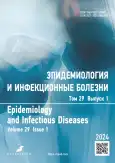A case of a combined course of typhoid fever and leptospirosis
- Authors: Kharlamova T.V.1, Barysheva I.V.1, Polovinkina N.A.1, Burdova E.Y.1, Bogdanova M.V.2
-
Affiliations:
- Peoples’ Friendship University of Russia named after Patrice Lumumba
- Infectious Diseases Clinical Hospital No. 2
- Issue: Vol 29, No 1 (2024)
- Pages: 74-81
- Section: CASE REPORTS
- URL: https://journal-vniispk.ru/1560-9529/article/view/254338
- DOI: https://doi.org/10.17816/EID624383
- ID: 254338
Cite item
Abstract
Coinfections are becoming increasingly relevant and urgently require research. The development of international tourism has caused the rapid spread of infectious diseases from countries with unfavorable sanitary and hygienic conditions. This article analyzes the clinical case of a patient who recently returned from India and developed a combined course of typhoid fever and leptospirosis due to astrovirus infection and blastocystosis. The disease was characterized by symptoms of enteritis, low-grade fever, and mild intoxication. The patient repeatedly sought medical help. Diagnoses of “acute respiratory viral infection” and “intestinal infection of unknown etiology” were established. Symptomatic therapy was performed without a positive effect; fever and severe asthenic syndrome persisted. The patient was hospitalized on the 18th day of illness with moderate severity. Taking into account clinical, anamnestic, and epidemiological data and laboratory examination results, typhoid fever was diagnosed. A polymerase chain reaction (PCR) test identified astrovirus RNA in the stool, and Blastocystis hominis was detected during stool examination. Despite the ongoing pathogenetic and antibacterial therapy, considering the determination of the pathogen’s sensitivity to antibiotics, the patient’s condition worsened. On day 23 of the illness, jaundice, hemorrhagic syndrome, and signs of acute renal failure were noted. Through in-depth analysis of changes in the clinical and laboratory findings, considering epidemiological history data (stay in a region endemic for leptospirosis), leptospirosis was diagnosed and treated with antibacterial therapy. Complex intensive therapy using extracorporeal treatment methods helped prevent the development of unfavorable outcomes of combined pathology. This clinical case emphasizes that doctors must be wary of imported infections and conduct additional comprehensive investigations of suspected cases.
Keywords
Full Text
##article.viewOnOriginalSite##About the authors
Tatiana V. Kharlamova
Peoples’ Friendship University of Russia named after Patrice Lumumba
Author for correspondence.
Email: kharlamova_tv@pfur.ru
ORCID iD: 0000-0003-4261-3000
SPIN-code: 2102-1234
MD, Cand. Sci. (Med.)
Russian Federation, 6 Miklukho-Maklay street, 117198 MoscowIrina V. Barysheva
Peoples’ Friendship University of Russia named after Patrice Lumumba
Email: barysheva-iv@pfur.ru
ORCID iD: 0000-0002-3543-9086
SPIN-code: 7381-8660
Senior Lecture of infectious diseases with courses of epidemiology and phthisiology department, RUDN University
Russian Federation, 6 Miklukho-Maklay street, 117198 MoscowNadezhda A. Polovinkina
Peoples’ Friendship University of Russia named after Patrice Lumumba
Email: polovinkina-na@pfur.ru
ORCID iD: 0000-0003-3183-852X
SPIN-code: 1377-8985
MD, Cand. Sci. (Med.), Associate Professor
Russian Federation, 6 Miklukho-Maklay street, 117198 MoscowElena Yu. Burdova
Peoples’ Friendship University of Russia named after Patrice Lumumba
Email: burdova_eyu@pfur.ru
ORCID iD: 0000-0003-0521-4502
SPIN-code: 8451-5845
assistant of Department infectious diseases with courses of epidemiology and phthisiology, RUDN University
Russian Federation, 6 Miklukho-Maklay street, 117198 MoscowMaria V. Bogdanova
Infectious Diseases Clinical Hospital No. 2
Email: Maria.v.bogdanova@gmail.com
ORCID iD: 0009-0000-7421-6398
infectious disease doctor
Russian Federation, 28/4-1 Volnaya street, 105187 MoscowReferences
- Balmasova IP, Malova ES, Sepiashvili RI. Viral and bacterial coinfection as a global problem of modern medicine. RUDN Journal of Medicine. 2018;22(1):29–42. (In Russ). doi: 10.22363/2313-0245-2018-22-1-29-42
- Shkarin VV, Saperkin NV. Interaction of concurrent infection pathogens in complex comorbidity (theoretical and practical issues). Russian Medical Inquiry. 2021;5(11):737–743. (In Russ). doi: 10.32364/2587-6821-2021-5-11-737-743
- Babayan ML. Modern principles of therapy for acute rotavirus infection in children. Pediatrics (Suppl Consilium Medicum). 2018;(1):101–105. (In Russ). doi: 10.26442/2413-8460_2018.1.101-105
- Shkarin VV, Chubukova OA, Blagonravova AS, Sergeeva AV. Problematic issues of combined intestinal infections. Journal Infectology. 2016;8(4):11–19. (In Russ). doi: 10.22625/2072-6732-2016-8-4-11-19
- Nikolaeva SV, Usenko DV, Gorelov AV. Combined acute enteric infections in children: clinical features and therapy approaches. RMJ. Medical Review. 2019;(5):26–29. (In Russ). EDN: DZTRUG
- Gonchar NV, Razd’yakonova IV, Skripchenko NV, Grigor’ev SG. Etiological and epidemiological features of concomitant acute intestinal infections in children. Journal Infectology. 2020;12(2): 113–118. (In Russ). doi: 10.22625/2072-6732-2020-12-2-113-118
- Radhakrishnan A, Als D, Mintz ED, et al. Introductory article on global burden and epidemiology of Typhoid fever. Am J Trop Med Hyg. 2018;99 Suppl. 3:4–9. doi: 10.4269/ajtmh.18-0032
- Lobzin YuV, Lvov VL, Kaira AN, et al. Epidemiological features and immunization against typhoid fever. Infectious Diseases: News, Opinions, Training. 2020;9(2):106–114. (In Russ). doi: 10.33029/2305-3496-2020-9-2-106-114
- Nikulina MA, Granitov VM, Tanashkin SF, Volchkova EV, Nemilostiva EA. Problems finding imported case leptospirosis (clinical observation). Epidemiology and Infectious Diseases. 2017;22(1):36–41. (In Russ). doi: 10.17816/EID40969
- Novak KE, Dyachkov AG, Esaulenko EV. Epidemiological features and evolution of clinical presentation of typhoid fever in Saint-Petersburg. Journal Infectology. 2019;11(1):25–32. (In Russ). doi: 10.22625/2072-6732-2019-11-1-25-32
- Gancheva G. Prognostic Value of Early Clinical Diagnosis of Leptospirosis. Journal of IMAB. 2022;28(2):4450–4455. doi: 10.5272/jimab.2022283.4450
- Parker TM, Murray CK, Richards AL, et al.; Concurrent Infections in Acute Febrile Illness Patients in Egypt. Am J Trop Med Hyg. 2007;77(2):390–392.
- Anupriya A, Meera J, Uma A. Dual Edge Sword — Leptospirosis and Typhoid Coinfection with Rare Complications — A Case Report. Sch J Med Case Rep. 2016;4(5):363–365. doi: 10.36347/sjmcr.2016.v04i05.025
- Maleev VV, Tokmalaev AK, Kozhevnikova GM, et al. Current view on Blastocystis species: clinical forms, diagnosis and treatment. Terapevticheskii arkhiv. 2020; 92(11):86–90. (In Russ). doi: 10.26442/00403660.2020.11.000816
Supplementary files







